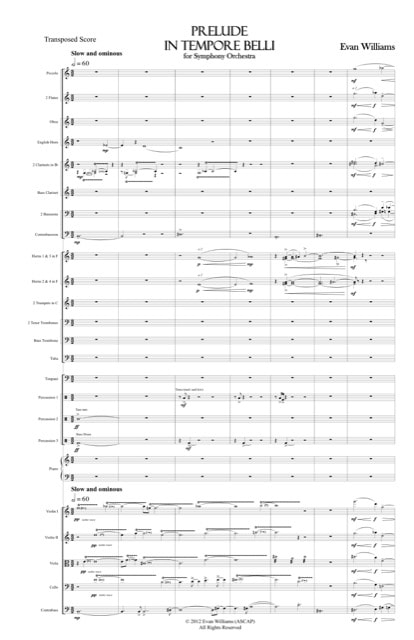Prelude in Tempore Belli (SCORE ONLY)
SKU:
$38.00
$38.00
Unavailable
per item
Composer: Evan Williams
Duration: 6:00
Scoring: orchestra
(Piccolo, 2 Flutes, Oboe, English Horn, 2 Clarinets, Bass Clarinet, 2 Bassoons, Contrabassoon, 4 Horns in F, 2 Trumpets, 2 Tenor Trombones, Bass Trombone, Tuba, Timpani
3 Percussion*, Piano, and Strings)
*1- Toms (medium and low), Vibraphone, Snare Drum
2- Tam-tam, Suspended Cymbal, Crash Cymbals
3- Bass Drum, Chimes (Tubular Bells)
Materials: score (11 x 17)
Duration: 6:00
Scoring: orchestra
(Piccolo, 2 Flutes, Oboe, English Horn, 2 Clarinets, Bass Clarinet, 2 Bassoons, Contrabassoon, 4 Horns in F, 2 Trumpets, 2 Tenor Trombones, Bass Trombone, Tuba, Timpani
3 Percussion*, Piano, and Strings)
*1- Toms (medium and low), Vibraphone, Snare Drum
2- Tam-tam, Suspended Cymbal, Crash Cymbals
3- Bass Drum, Chimes (Tubular Bells)
Materials: score (11 x 17)
Program Note
Joseph Haydn's Missa in Tempore Belli (Mass in Time of War), from which Prelude in Tempore Belli takes its name, was written during the tumultuous French Revolutionary Wars. Whether this mass, also known as the "Paukenmesse" for its use of timpani, is an anti-war statement or a literal pounding of the war drums is a point of debate for scholars. Yet, one of the most striking moments of this work is the sudden interruption of the stately Credo by the text "Et incarnatus est (and [Christ] was made flesh)" in a minor key. Bach also employed a minor key for this text in his B Minor Mass, both curious choices given that the birth of Jesus Christ is a cause for celebration in the Christian tradition. The Catholic church even goes so far as to call the "original sin" of Adam and Eve a "Happy Fault" necessary for the coming of their Messiah during the Easter Vigil. Perhaps to Bach and Haydn the corruption of mankind that required divine intervention to remedy was a cause of shame. And warfare is perhaps the greatest point of that shame.
Haydn's "Et incarnatus est" motive is repeated like a mantra in the final moments of Prelude in Tempore Belli transforming the piece into its tumultuous ending. The piece also employs the American wartime melodies "Johnny Get Your Gun (Over There)," written by George M. Cohan as a call to arms at the start of WWI, and "Johnny Has Gone for a Soldier (Buttermilk Hill)," a lover's lament from the Revolutionary War for her fallen soldier.
— Evan Williams
Haydn's "Et incarnatus est" motive is repeated like a mantra in the final moments of Prelude in Tempore Belli transforming the piece into its tumultuous ending. The piece also employs the American wartime melodies "Johnny Get Your Gun (Over There)," written by George M. Cohan as a call to arms at the start of WWI, and "Johnny Has Gone for a Soldier (Buttermilk Hill)," a lover's lament from the Revolutionary War for her fallen soldier.
— Evan Williams
Reproduction Notice:
This program note may be freely reproduced in concert programs, provided that proper credit is given to the composer.
This program note may be freely reproduced in concert programs, provided that proper credit is given to the composer.

